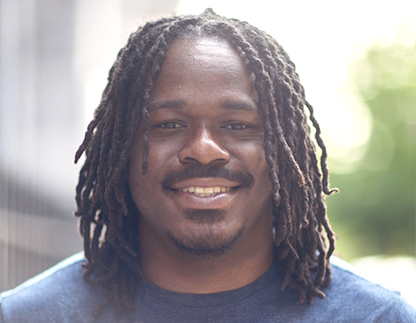As I learn more about my history, I’m reminded that no matter what I’m facing, someone before me has done it and shown that it’s possible.”
Shawn Antoine II
MFA Candidate in Documentary Media

Shawn Antoine II is an MFA candidate in Documentary Media in the School of Communication. His films tell stories that highlight the resilience and experiences of Black communities. He draws inspiration from his time growing up in Harlem, as well as his current surroundings, and explores how things like gentrification and social justice movements impact Black lives. Shawn’s thesis film explores his family’s migration from the South to the North and reflects on broader themes of resilience in Black history.
How would you describe your research and/or work to a non-academic audience?
I’d describe my work as telling powerful stories that connect people to history and community, especially focusing on the experiences and resilience of Black people. As a filmmaker, I use documentaries to explore the beauty and complexity of cultures, often highlighting how historical events shape lives today. My films dive into the unique stories of people and places, whether it's capturing the spirit of Harlem’s basketball courts or exploring the impact of displacement in Chicago. Through my lens, I aim to inspire and inform by bringing untold stories to light in a way that everyone can relate to and understand.
Tell us what inspired your research and/or work.
Growing up in Harlem, walking through streets named after influential figures in the Black community—many of them unsung heroes—has been a constant source of inspiration for my work. It fuels my desire to tell the untold stories that have shaped our history. I’m also passionate about bridging the gap between stories from across the diaspora, finding ways to connect and converge our histories, so that these narratives are not only preserved but shared in a meaningful way. This sense of purpose drives everything I do as a filmmaker.
What have been some of the most memorable twists and turns of your career?
One of the most memorable twists in my career happened during my freshman year of college. I was one of the top recruits to play football at the University of Rhode Island but got injured during spring practice, which meant I had to sit out the upcoming fall season. To fill my time, I started taking photos of protests, which eventually got me involved in social justice movements. That experience led to the creation of my first documentary. What seemed like a setback at the time—a freak accident—ended up guiding me to my true purpose: storytelling.
What do you find both rewarding and challenging about your research and/or work?
I find it incredibly rewarding that people in my community value my work and appreciate how I’m filling the gap by documenting real stories—stories about everyday Black lives, not just those of celebrities. However, one of the challenges I face is that stories centered on African American and Black experiences are often not considered "diverse enough" for funding. Despite this, I’m determined to create my own lane and opportunities through my work, so these important stories continue to be told.
Why Northwestern?
I chose Northwestern because I wanted to be in an environment that values not only the creative side of filmmaking but also the academic and research aspects. As one of the top academic institutions in the country, Northwestern offers access to a wide range of disciplines that can foster valuable relationships as I develop my practice. I was also excited to be near Chicago, a city rich with untold stories of African American history, where I could collaborate with the community and explore these narratives further.
What inspires you?
I draw immense inspiration from my ancestors. As I learn more about my history, I’m reminded that no matter what I’m facing, someone before me has done it and shown that it’s possible. Their resilience and achievements serve as powerful reminders that I can persevere and create my own path.
What advice would you give your younger self or someone considering a similar path?
I’d tell my younger self—and anyone on a similar path—to believe in yourself. Too often, we look for validation from others, thinking it’ll get us where we need to be, but the truth is, you already have what it takes. Be your own superhero. Every day is an opportunity to live and tell stories, and the story you want to see on screen won’t be told until you bring it to life. Trust your vision and go after it.
Tell us about a current achievement or something you're working on that excites you.
Lately, I've been focusing on telling stories about community and resilience, which are central themes in my work. For my thesis film, I’m excited to showcase a personal story—my own family’s migration from the South to the North. It's a reflection of their resilience and a testament to the broader journey of so many Black families. Sharing this part of my history feels both deeply personal and universally relevant, and I can’t wait to bring it to life on screen.
Publish Date: October 15, 2024
If you know a graduate student, postdoctoral scholar, graduate faculty member, staff member, or a member of our TGS alumni population who would make a great candidate for our TGS Spotlight Series, please complete this brief TGS Spotlight Series Nomination Form.